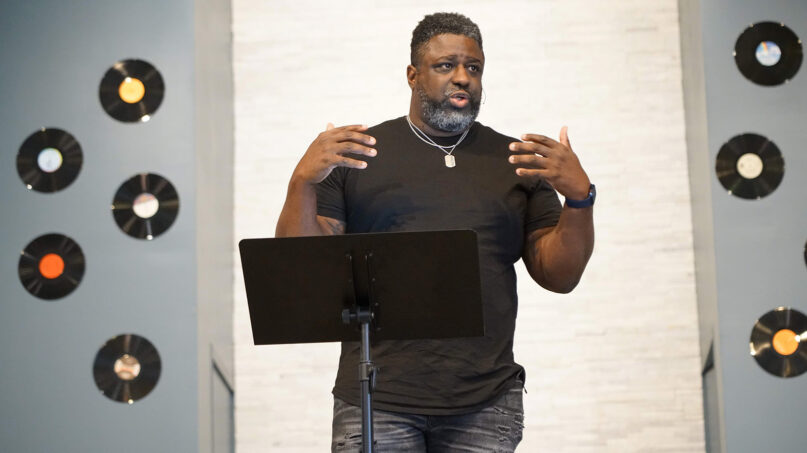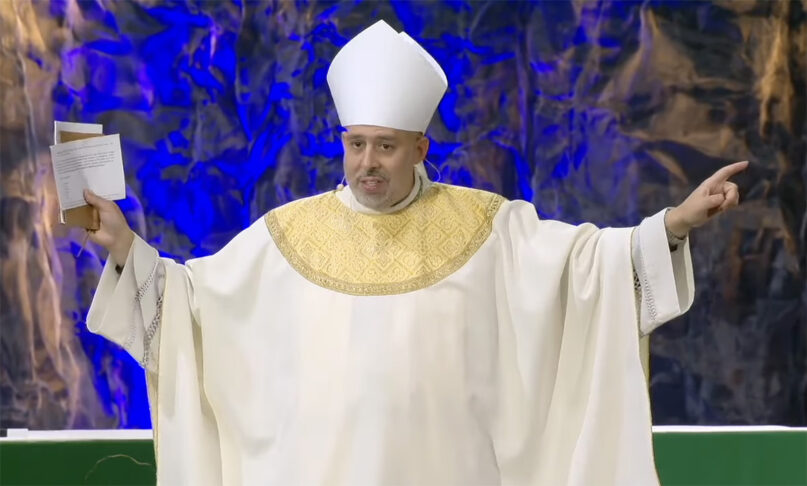(RNS) — Like its politics, the United States’ religious scene could at times this year appear intractably stalled by partisanship and warring ideologies. But Americans of faith and observers of the religious landscape can also be encouraged and fascinated by the new voices that have emerged in past 12 months, in ancient faith traditions and new movements alike. These emerging faith leaders promise to take the country in new directions, whether offering new perspectives on immigrant rights in a new Trump administration, pushing young people to engage in faith-based environmental activism or fighting ableism.
Not all of the new names that came to our attention this year offer escape from our discord: Some are engaged in political fights over whether the country, or our households, should adopt a Christian polity to live up to our highest ideals.
Here are some of the newsmakers we’ll be keeping our eyes on in the year ahead.
Tia Levings
Author and social media influencer

Tia Levings. (Photo by Hannah Joy Photography)
Levings, author of the New York Times bestseller “A Well-Trained Wife,” married at 19 into a highly patriarchal form of Christianity that puts all authority in the hands of husbands and fathers. A former “trad wife” — a woman who lives according to hypertraditional notions of motherhood and domesticity — Levings, who now identifies as “spiritually private,” sheds light on the harms of that lifestyle, while warning that this little-known conservative Christian sector is increasing in political power as it promotes “dominionism,” the belief that Christians have a mandate to rule society.
Sister Josephine Garrett
Nun, podcaster

Sister Josephine Garrett. (Courtesy photo)
Raised Baptist, Garrett converted to Catholicism in 2005 and professed her final vows as a sister of the Holy Family of Nazareth in 2020. These days, the onetime Bank of America vice president is a sought-after speaker, as well as the host of the podcast “Hope Stories,” launched in 2023, focusing on Black Catholics in its first season. This year it focused on mental health and faith, drawing on Garrett’s background as a licensed counselor.
She brought the same expertise to the U.S. Catholic bishops’ National Eucharistic Congress earlier this year, where she spoke on the event’s third day in addition to leading a breakout session. “Stop limiting the places where God can reign, stop creating blocks to what God is about, where his grace can be about at work,” Garrett told reporters this summer.
Gopal Patel
Environmental activist

Gopal Patel addresses the TED Countdown Summit in Detroit on July 14, 2023. (Photo by Jasmina Tomic/TED)
After helping to lead Bhumi Global, a nonprofit whose environmentalism is informed by Hinduism, Patel and his co-founders shut it down earlier this year to let younger leaders take up the banner. Today the 40-something, who grew up in the U.K. and now lives in New Jersey, has advised the United Nations as well as major nonprofits on environment and faith concerns. “We like to think that we played some role in most Hindu organizations now talking about the environment in a very concrete way,” Patel told RNS in an interview during the U.N. Climate Week in September.
Patel believes faith groups need to partner with others, saying that while faith groups can bring people in large numbers, “faiths do not move at speed. They have scale, but the scale takes a really, really, really long time,” he said. “So let’s partner with faith and youth groups, faith and women led-groups, faith and the business community. The crisis isn’t going to be solved by one sector.”
Lamar Hardwick
Pastor, autism advocate

Pastor Lamar Hardwick speaks at Tri-Cities Church in East Point, Ga. (Photo by Tonesha Smith Photography)
Hardwick, the retired pastor of Tri-Cities Church in East Point, Georgia, was diagnosed with autism at age 36 in 2014. His blog about his experience quickly became popular and resulted in a 2021 book, “Disability and the Church: A Vision for Diversity and Inclusion,” aimed at helping houses of worship reevaluate how to welcome those on the autism spectrum. Soon, he was dubbed “the Autism Pastor.”
His second book, “How Ableism Fuels Racism: Dismantling the Hierarchy of Bodies in the Church,” released earlier this year, examines the normalization of suffering of both Black and disabled bodies and includes lessons he has learned from a cancer diagnosis. His treatments have forced Hardwick into retirement at age 45 but have not slowed his pen.
Joseph Espaillat
Auxiliary bishop in the Archdiocese of New York

Bishop Joseph Espaillat preaches during the National Catholic Youth Conference in Indianapolis in November 2023. (Video screen grab)
When church officials called to inform Bronx native Espaillat that he was about to become the youngest U.S. Catholic bishop at age 45, as well as the church’s first Dominican American bishop, he didn’t pick up, he told the “Today” show in 2022. Not recognizing the number, he thought, “I don’t owe anybody money.”
Two years later, Espaillat is encouraging his fellow bishops to listen to the increasingly crucial demographic of young Latinos: About 60% of Catholics under 18 are Hispanic, according to a Boston College study. Known for rapping at church events and his “Sainthood in the City” podcast, Espaillat has achieved acclaim as a powerful preacher.
Kevin King
Disaster relief leader

Kevin King. (Photo courtesy of Mennonite Disaster Service)
When massive storms hit communities in America’s hurricane or tornado country, King, the executive director of Mennonite Disaster Service, arrives within days to help communities recover, in the short term and over the long haul. In early October, after North Carolina and other states were hit by Hurricane Helene, he recognized that residents were in for a long, slow rebuild and began looking to house volunteers for the next three or four years.
Faith-based groups such as MDS make up about half of the members of National Voluntary Organizations Active in Disaster, which helps disaster relief groups work together. These groups will play a key role in the recovery from Helene and future disasters, even as organized religion declines and new recruits become rarer.
Russ Vought
Conservative activist and Trump official

Russell Vought. (Photo courtesy of Center for Renewing America)
An architect of Project 2025, a conservative agenda for Donald Trump’s second presidential term, Vought was nominated to be the new Trump administration’s director of the Office of Management and Budget. An evangelical Christian and founder of the Center for Renewing America, a nonprofit that has backed many local school board “anti-woke” debates, Vought has claimed that America is “in the late stages of a complete Marxist takeover of the country,” according to ProPublica, and has called Trump “a gift from God.” Meanwhile, “woke pastors,” he argued, have angered their followers by speaking about racism and social justice, issues he sees as leftist propaganda.
Julia Oseka
Synod on Synodality delegate

Julia Oseka in St. Peter’s Square at the Vatican. (Courtesy photo)
As a senior at St. Joseph’s University in Philadelphia, Oseka was one of 10 voting participants from the U.S. and Canada at the Vatican’s Synod on Synodality who were not bishops, and she was the youngest ever female voting delegate to the General Assembly of Bishops. Oseka, a physics and theology major who identifies herself as a feminist, told America Magazine that discussions of sensitive topics at the synod were more cordial than expected and made her hopeful, but she expressed disappointment that concerns about LGBTQ Catholics’ inclusion were virtually absent in the synod’s final documents, noting, “even the acronym LGBTQ didn’t make it into the final synthesis report.”
R.L. Stollar
Child liberation theologian

R.L. Stollar. (Courtesy photo)
Stollar is one of a handful of theologians whose observations about the rights of children are making inroads in churches, seminaries and parenting groups. A longtime child advocate and the creator of the site Homeschoolers Anonymous, Stollar is convinced that the Bible requires Christians to recognize that the impacts of child abuse, infant mortality and child trafficking are often overlooked. Drawing from understandings of God as a child (as embodied through Jesus) and as a defender of the oppressed, Stollar says children should be honored as full participants in worship, participate in decision-making and have input into child protection policies.
“For me, the ultimate goal of child liberation theology is for children themselves to take this theology and figure out what they want to do with it,” he told RNS last year.
Kaitlyn Schiess
Author, theologian and podcast host

Kaitlyn Schiess. (Photo by Season Moore Photography)
In April, Duke University doctoral student Schiess debuted a new weekly podcast, “Curiously, Kaitlyn,” which uses theological questions posed by kids to dig into and demystify concepts such as “substitutionary atonement” or “salvific status.” Her new gig came after her stint as a co-host on the “Holy Post,” a podcast by “VeggieTales” creator Phil Vischer and Christian author Skye Jethani. On her podcasts and in her latest book, “The Ballot and the Bible: How Scripture Has Been Used and Abused in American Politics and Where We Go from Here,” she shows her deep scholarship — she also has a degree from Dallas Theological Seminary — and flashes of anger at the rightward drift of evangelical Christianity.
Democratic state-level politicians of faith
As the center of many hot-button political debates moves to state legislatures, some of the most visible policymakers and stumbling blocks for the rising Christian right may be openly religious lawmakers such as Texas state Rep. James Talarico, a Presbyterian seminary student, who has attracted attention for his opposition to bills he says forward Christian nationalism. In Georgia, state Rep. Ruwa Romman is the first Palestinian American and first Muslim elected to the Legislature. Put forward this summer by the “uncommitted” movement as a possible speaker on behalf of Palestinians in Gaza at the Democratic National Convention, she was denied the opportunity but has spoken out since on how to attract young, disillusioned voters back into the party.
Perhaps the most prominent state-level politician, Pennsylvania Gov. Josh Shapiro, has spoken affectingly of his Jewish faith in political speeches, most noticeably in stumping for Democratic presidential nominee Vice President Kamala Harris on the campaign trail. A possible 2028 presidential candidate for the Democrats, Shapiro will likely continue to shape how religion and politics are combined over the next four years.